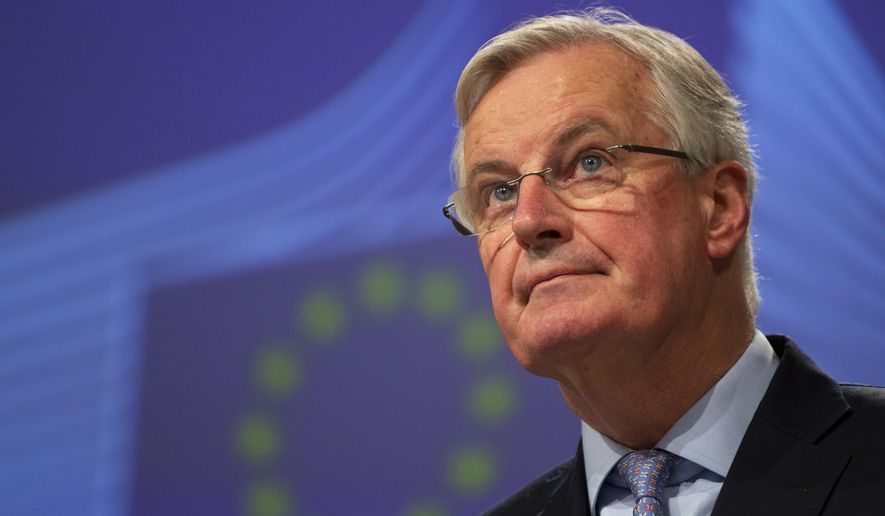BRUSSELS (AP) - The EU’s chief trade negotiator with former member Britain warned Thursday of “serious divergences” between the two sides after the conclusion of the first round of talks.
Britain, meanwhile, predicted a tough road ahead for the talks, which aim to secure a new agreement for trade and a host of other areas by the end of the year.
Speaking at a press conference in Brussels after four days of talks, EU negotiator Michel Barnier said the two sides had major disagreements in four areas: a “level playing field” for competition, security cooperation, governance of the future relationship and fishing.
“Our differences come as no surprise,” Barnier said. “Especially after only one round of negotiations. But some are very, very difficult.”
Britain left the EU on Jan. 31, the first country ever to do so. This week’s talks marked the start of a process aimed at securing new commercial, fishing and other ties with the world’s biggest trading bloc.
The teams are expected to meet every two to three weeks, alternating between Brussels and London. Half a dozen or so rounds of negotiations are expected to take place by the end of June.
Under the divorce agreement signed last year, Britain must decide by June 30 whether it wants to extend a transition period that is aimed at smoothing its departure from the bloc, of which it was a member of for 47 years. Barnier said the changes that will come at the end of the transition period are being “underestimated,” and warned that it won’t be “business as usual” as new customs arrangements, for example, come into force.
During the transition, Britain remains within the EU’s economic orbit, including its single market for trade in goods and services, even though it has left its political institutions.
British Prime Minister Boris Johnson has insisted that he won’t agree to extend the transition period beyond the end of this year. That means that if the two sides can’t strike a deal by Dec. 31, Britain and the EU will then trade on terms outlined by the World Trade Organization, which would see tariffs and other restrictions imposed.
As expected, discussions on future fishing rights have proved difficult. Johnson says Brexit means that Britain takes control of its waters. The EU, meanwhile, wants to make sure its fishing fleets still have access to British waters, in much the same way as they do now.
Barnier said the U.K. has asked to negotiate separate reciprocal access on a yearly basis, “which simply cannot be done.”
On governance, Barnier said U.K. negotiators have asked for a series of sectoral agreements while the EU is pushing for one comprehensive deal that includes all topics up for discussion.
The EU is particularly vexed by concerns that Britain may diverge on rules and regulations to gain a competitive advantage so wants to make sure that a level playing field is agreed by London in return for a high degree of access to the single market. Barnier said Britain has made clear its intent to safeguard “high standards” but that it doesn’t want them codified in a common agreement.
Barnier also said that the two sides have big differences of opinion over the role of the European Court of Justice in interpreting future arrangements.
He added that British negotiators have asked to leave foreign policy and defence issues aside but that the EU is willing to discuss these subjects in the future if the U.K. wants to do so.
The British government said it was “pleased with the constructive tone from both sides” but also predicted the negotiations would be “tough.”
“In some areas there seems to be a degree of common understanding of how to take the talks forward,” it said in a statement. “In other areas, such as fishing, governance, criminal justice and the so-called ‘level playing field’ issues there are, as expected, significant differences.”
It said any deal had to respect the “legal and economic independence” of the U.K. Britain has accused the EU of seeking to impose tougher conditions on the U.K. that it has for other countries with which it has free trade deals, such as Canada.
The next round of talks is due to open in London on March 18.
___
Jill Lawless in London contributed to this story.
___
Follow AP’s full coverage of British politics and Brexit trade negotiations at https://apnews.com/Brexit




Please read our comment policy before commenting.